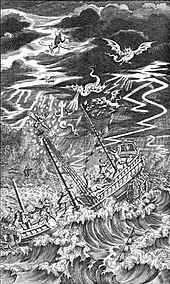The Tempest
The Tempest is a play by William Shakespeare, believed to have been written in 1610–1611, and thought by many critics to be the last play that Shakespeare wrote alone. It is set on a remote island, where the sorcerer Prospero, rightful Duke of Milan, plots to restore his daughter Miranda to her rightful place using illusion and skillful manipulation. He conjures up a storm, the eponymous tempest, to cause his usurping brother Antonio and the complicit King Alonso of Naples to believe they are shipwrecked and marooned on the island. There, his machinations bring about the revelation of Antonio's lowly nature, the redemption of the King, and the marriage of Miranda to Alonso's son, Ferdinand.
There is no obvious single source for the plot of The Tempest, but researchers have seen parallels in Erasmus's Naufragium, Peter Martyr's De orbe novo, and eyewitness reports by William Strachey and Sylvester Jordain of the 1609 shipwreck of the Sea Venture on the islands of Bermuda, and the subsequent conflict between Sir Thomas Gates and Sir George Somers. In addition, one of Gonzalo's speeches is derived from Montaigne's essay Of the Canibales, and much of Prospero's renunciative speech echoes a speech by Medea in Ovid's poem Metamorphoses. The masque in Act 4 may have been a later addition, possibly in honour of the wedding of Princess Elizabeth and Frederick V in 1613. The play was first published in the First Folio of 1623.
The story draws heavily on the tradition of the romance and it was influenced by tragicomedy, the courtly masque and perhaps the commedia dell'arte. It differs from Shakespeare's other plays in its observation of a stricter, more organised neoclassical style. Critics see The Tempest as explicitly concerned with its own nature as a play, frequently drawing links between Prospero's "art" and theatrical illusion, and early critics saw Prospero as a representation of Shakespeare, and his renunciation of magic as signalling Shakespeare's farewell to the stage. The play portrays Prospero as a rational, and not an occultist, magician by providing a contrast to him in Sycorax: her magic is frequently described as destructive and terrible, where Prospero's is said to be wondrous and beautiful. Beginning in about 1950, with the publication of Psychology of Colonization by Octave Mannoni, The Tempest was viewed more and more through the lens of postcolonial theory—exemplified in adaptations like Aimé Césaire's Une Tempête set in Haiti—and there is even a scholarly journal on post-colonial criticism named after Caliban.
The Tempest did not attract a significant amount of attention before the ban on the performance of plays in 1642, and only attained popularity after the Restoration, and then only in adapted versions. In the mid-19th century, theatre productions began to reinstate the original Shakespearean text, and in the 20th century, critics and scholars undertook a significant re-appraisal of the play's value, to the extent that it is now considered to be one of Shakespeare's greatest works. It has been adapted numerous times in a variety of styles and formats: in music, at least 46 operas by composers such as Fromental Halévy, Zdeněk Fibich and Thomas Adès; orchestral works by Tchaikovsky, Arthur Sullivan, Jean Sibelius, and Arthur Honegger; and songs by such diverse artists as Ralph Vaughan Williams, Michael Nyman and Pete Seeger; in literature, Percy Bysshe Shelley's poem With a Guitar, To Jane and W. H. Auden's The Sea and the Mirror; novels by Aimé Césaire and The Diviners by Margaret Laurence; in paintings by William Hogarth, Henry Fuseli, and John Everett Millais; and on screen, ranging through a hand-tinted version of Herbert Beerbohm Tree's 1905 stage performance, the science fiction film Forbidden Planet in 1956, Peter Greenaway's 1991 Prospero's Books featuring John Gielgud as Prospero, to Julie Taymor's 2010 film version which changed Prospero to Prospera (as played by Helen Mirren), and Des McAnuff's 2010 Stratford Shakespeare Festival production which starred Christopher Plummer.

Date
he Tempest is thought by most scholars to have been written in 1610–11, and is generally accepted as the last play that Shakespeare wrote alone, although some have questioned either or both assertions. Scholars also note that it is impossible to determine if the play was written before, after, or at the same time as The Winter's Tale, the dating of which has been equally problematic. Edward Blount entered The Tempest into the Stationers' Register on 8 November 1623. It was one of 16 Shakespearean plays that Blount registered on that date.

Text
The Tempest presents relatively few textual problems in comparison with many of Shakespeare's other plays. First published in the First Folio in December 1623, the play is first in the volume, leading the section of comedies. The play has more stage directions than any of Shakespeare's other plays, though they appear to have been written for readers instead of actors. Scholars infer from this that the editors of the volume, John Heminges and Henry Condell, included the directions to aid readers, and they were not necessarily Shakespeare's. Scholars have also wondered about the masque in Act 4, which some think was an interpolated afterthought, possibly added for the wedding of Princess Elizabeth and Frederick V in 1613. However, other scholars see this as unlikely, arguing that taking the masque out of the play creates more problems than it solves.


















0 comments
Sign in or create a free account